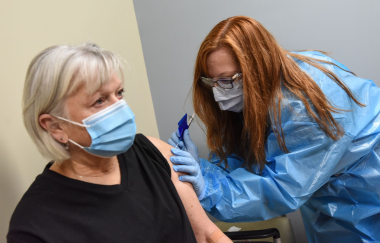“The Swiss Army Knives of Healthcare.” When Cynthia Lauer, MD, FACS discovered that metaphor for trauma surgeons, she found it fitting. “Trauma surgeons impact the entire hospital,” she says. “We're involved heavily in the emergency department, the operating room, the intensive care unit and on the floors. We’re all over the hospital.”
During the COVID-19 pandemic, trauma surgeons like Dr. Lauer are invaluable. With experience across the hospital, as well as training in disaster management, they can collaborate to create solutions during a time of constant change and resource challenges.
“It's been very helpful to look at other systems that have been exposed to the COVID-19 epidemic before it reached the Charlotte area. Trauma surgeons have a tight-knit community, and we can draw on partners from other facilities and learn from them,” Dr. Lauer says. For months, she and her colleagues have read papers by surgeons in Wuhan, China, and, more recently, in New York City and New Orleans.
“We’re trying to plan as best we can and to anticipate as many problems as we can,” she says.
Devising an Algorithm to Help Hospitals through COVID-19
In early March – just as COVID-19 began to affect the United States – Dr. Lauer was part of a group of surgeons at Atrium Health’s Trauma Care who began a crucial project. Their goal was to create a plan to address a crucial question of this pandemic: During a time when situations change so rapidly, how can hospitals adapt the roles of surgeons to address the most pressing needs of the moment?
“Before this spread in New York, people weren’t as understanding of the situation. Samuel Ross, MD, MPH, unified our surgery department in how big a deal this is,” Dr. Lauer says. “Our group identified that this was a significant issue and realized that we had to respond briskly to get ahead of it.”
They worked at a rapid pace. Within 48 hours, they developed a tiered-response algorithm to allow hospitals to be flexible as patients’ needs change. “This algorithm allows surgical teams to flex to the needs of whatever the hospital is most in need of.” Four days later, they completed a paper about their new algorithm. By the end of March, the Journal of the American College of Surgeons published their paper, which will allow hospitals around the country to adopt Atrium Health’s plan during the COVID-19 pandemic.
“We created a local process, and then we adapted it so that it would be usable for any department to maximize resources to the needs at hand,” Dr. Lauer says.
Different Backgrounds, One Mission
The Atrium Health team drew upon their diverse backgrounds and collaborative natures to create this algorithm so quickly. Dr. Ross, the paper’s lead author, has had a career in both public health and trauma surgery. Dr. Lauer spent much of her career as a U.S. Army surgeon, with experience in mass casualty incidents and disaster planning. Ashley Britton Christmas, MD, the president of the Eastern Association for the Surgery of Trauma, is involved in the local and national trauma community. William Miles, MD, worked for decades in disaster management planning.
They pooled their expertise to create a unified plan for surgical teams during COVID-19, giving these “Swiss Army Knives of Healthcare” an additional tool during a critical time.
“Atrium Health and all of these healthcare systems are trying to flex to meet these new needs and to be as agile as possible,” Dr. Lauer says. “The more creative and flexible we are, the more we'll be able to adapt rapidly to deal with this evolving crisis.”
Stay informed on COVID-19 news, take a risk assessment and learn how to access care by visiting AtriumHealth.org/Coronavirus.



